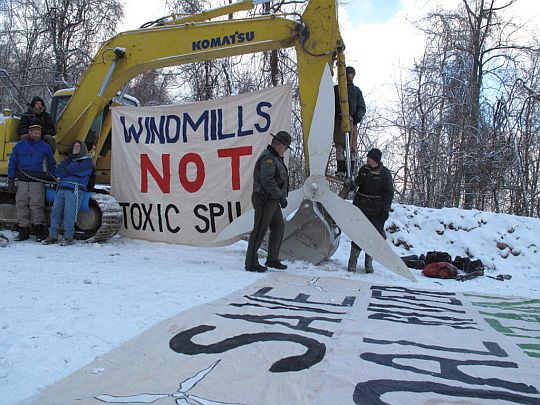
"Give me but a banner to plant upon the mountains of West Augusta, and I will rally about it the brave men who will lift our bleeding country from the dust, and set her free."
— George Washington, 1779
In Pettus, West Virginia this morning, five Coal River Mountain activists were arrested and charged with trespassing after locking themselves to a bulldozer and a backhoe at a Massey Energy mountaintop-removal mine site.
In the face of an impending 6,600 acre mountaintop removal strip mine, they planted a banner for the Coal River Wind Project, a nationally acclaimed proposal that would create 200 local construction jobs and 50 permanent jobs, enough energy for 150,000 homes, and allow for sustainable forestry and mountain tourism projects, as well as a limited amount of underground mining.
After the TVA coal ash disaster in December, when a billion gallons of coal ash poured out of a pond and deluged 400 acres of land in six feet of sludge, the Coal River Mountain activists fear blasting for the proposed mountaintop removal site on Coal River Mountain, which rests beside a 6 billion-gallon toxic coal waste sludge dam above underground mines, could be catastrophic for the communities downstream.
“Massey could flood the towns of Pettus, Whitesville and Sylvester with toxic coal sludge,” said Julia Bonds, of Rock Creek, W.Va. “Blasting at a multi-billion-gallon sludge lake over underground mines could cause the sludge to burst through and kill thousands of people.”
“The governor and county legislators have failed to act, so we’re acting for them,” Coal River Wind advocate Rory McIlmoil said. “They shouldn’t allow the wind potential on Coal River Mountain to be destroyed, and the nearby communities endangered, for only 17 years of coal. There is a better way to develop the mountain and strengthen the local economy that will create lasting jobs and tax revenues for this county, and that’s with wind power.”
Over 470 mountains in central Appalachia have been blown to bits by strip mining. Over 1,200 miles of waterways have been destroyed with mining fill; wells have been busted and polluted with toxic waste. The mechanization of aboveground mountaintop removal has prevented any diversified economy and led to a decrease in coal mining jobs in some of the highest poverty-stricken strip-mining areas.
Testimonies from Coal River Mountain residents and the Climate Ground Zero campaign:
"Nonviolent direct action seeks to create such a crisis and foster such a tension that a community which has constantly refused to negotiate is forced to confront the issue."
— Martin Luther King, Jr., to the eight fellow clergymen who opposed the civil rights action, "Letter from Birmingham Jail," Why We Can’t Wait, 1963


